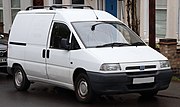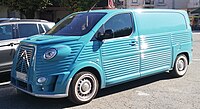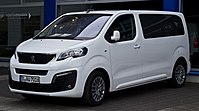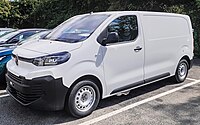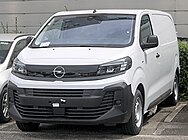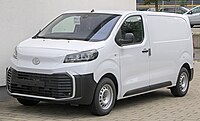Citroën Jumpy
| Citroën Jumpy | |
|---|---|
 | |
| Overview | |
| Manufacturer | Sevel Nord Stellantis (2021–present) |
| Production | 1994–present |
| Body and chassis | |
| Class | Light commercial vehicle Large MPV |
| Body style | 4/5-door panel van 4/5-door minivan |
| Layout | Front-engine, front-wheel-drive |
| Chronology | |
| Predecessor |
|
| Successor | Fiat Talento (for Fiat Scudo) |
The Citroën Jumpy (badged Citroën Dispatch in some countries) is a light commercial van jointly developed by FCA Italy and PSA Group (currently Stellantis), and mainly manufactured by Sevel, a joint venture between the two companies since 1994. The Jumpy was also sold as the Peugeot Expert and Fiat Scudo beginning in 1995.
All three models were facelifted in March 2004 before being replaced by new, second-generation models in 2007. The redesigned models again shared the same design and engineering, with subtle trim changes between each brand. The second generation received a small facelift in February 2012 and from July 2013, Toyota began sales of a rebadged version called the Toyota Proace.
In December 2015, Citroën, Peugeot and Toyota unveiled their new generation of these vehicles in people carrying-specifications called the Citroën SpaceTourer and Peugeot Traveller,[2] with Toyota retaining the Proace name. The commercial versions premiered later, retaining the Peugeot Expert and Citroën Jumpy names.
In May 2016, the Fiat Scudo was replaced by a second generation of the Fiat Talento, a rebadged Renault Trafic.[3] From the 2019 model year, the Jumpy has been rebadged as the Opel/Vauxhall Vivaro, replacing the previous Vivaro model, which, from 2001 to 2019, had been based on the Renault Trafic. From the 2022 model year, the Jumpy has also been rebadged as the Fiat Scudo, to replace the previous Talento model, which, from 2016 to 2020, had been based on the Renault Trafic.[4]
First generation (1994)
| First generation | |
|---|---|
 (1994–2004) Citroën Jumpy | |
| Overview | |
| Also called | Citroën Dispatch (UK and Ireland) Fiat Scudo Peugeot Expert |
| Production | June 1994 – January 2007 (Citroën) July 1995 – January 2007 (Peugeot) February 1996 – January 2007 (Fiat) |
| Assembly | France: Lieu-Saint-Amand (Sevel Nord) |
| Body and chassis | |
| Related | Eurovans |
| Powertrain | |
| Engine | |
| Dimensions | |
| Kerb weight | 1,380 kg (3,042 lb)-1,450 kg (3,197 lb)[5] |
Citroën released the first-generation Jumpy in June 1994, naming the model "Dispatch" in English-speaking markets. Peugeot and Fiat followed with their rebadged models in July 1995 and February 1996 respectively. The vans differ little technically and visually, an example of badge engineering.
They share mechanicals and body structure with the Sevel Nord Eurovans minivans: the Citroën Evasion (Synergie), Fiat Ulysse, Lancia Zeta, and Peugeot 806. The engines available throughout the models do differ, with the Fiat getting its own engines distinct from those fitted to the Citroën and Peugeot. The Fiat Scudo replaced the first generation of the Fiat Talento.
Facelift
The model received a facelift in 2004, which changed most of the front end including the bumper and bonnet; for the first time, the headlamps were combined with the indicators rather than being a separate set of lights.
Engines
| Model | Engine | Displacement | Valvetrain | Fuel system | Max. power at rpm | Max. torque at rpm | Years |
|---|---|---|---|---|---|---|---|
| Petrol engines | |||||||
| 1.6 i.e. | Fiat 220A2000 | 1,581 cc | SOHC 8v | Single-point fuel injection | 79 PS (58 kW; 78 hp) @ 5,750 rpm | 125 N⋅m (92 lb⋅ft) @ 2,750 rpm | 1996–2000 |
| 2.0 i.e. | PSA EW10 | 1,997 cc | DOHC 16v | Multi-point fuel injection | 136 PS (100 kW; 134 hp) @ 6,000 rpm | 190 N⋅m (140 lb⋅ft) @ 4,100 rpm | 2000–2006 |
| Diesel engines | |||||||
| 1.9 D | PSA XUD9 | 1,905 cc | SOHC 8v | Indirect injection | 69 PS (51 kW; 68 hp) @ 4,600 rpm | 120 N⋅m (89 lb⋅ft) @ 2,000 rpm | 1996–1999 |
| 1.9 D | PSA DW8 | 1,868 cc | SOHC 8v | Indirect injection | 69 PS (51 kW; 68 hp) @ 4,600 rpm | 125 N⋅m (92 lb⋅ft) @ 2,500 rpm | 1999–2006 |
| 1.9 TD | PSA XUD9TE | 1,905 cc | SOHC 8v | Indirect injection | 92 PS (68 kW; 91 hp) @ 4,000 rpm | 196 N⋅m (145 lb⋅ft) @ 2,250 rpm | 1996–1999 |
| 2.0 JTD | PSA DW10 | 1,997 cc | SOHC 8v | Common rail direct injection | 94 PS (69 kW; 93 hp) @ 4,000 rpm | 215 N⋅m (159 lb⋅ft) @ 1,750 rpm | 1999–2006 |
| 2.0 JTD | PSA DW10 | 1,997 cc | SOHC 8v | Common rail direct injection | 109 PS (80 kW; 108 hp) @ 4,000 rpm | 250 N⋅m (184 lb⋅ft) @ 1,750 rpm | 1999–2006 |
| 2.0 JTD1 | PSA DW10 | 1,997 cc | DOHC 16v | Common rail direct injection | 109 PS (80 kW; 108 hp) @ 4,000 rpm | 270 N⋅m (199 lb⋅ft) @ 1,750 rpm | 2000–2006 |
1 Only for Scudo Combinato
Second generation (G9; 2006)
| Second generation | |
|---|---|
 Citroën Jumpy | |
| Overview | |
| Also called | Citroën Dispatch (UK and Ireland) Fiat Scudo Peugeot Expert Toyota Proace (2013–2016) |
| Production | January 2007 – March 2016 (SWB) November 2006 – March 2016 (LWB) July 2013 – March 2016 (Toyota Proace) |
| Assembly | France: Lieu-Saint-Amand (Sevel Nord) |
| Body and chassis | |
| Body style | 4/5-door panel van 4/5-door minibus |
| Powertrain | |
| Engine | |
| Transmission | 5-speed Manual 6-speed manual 6-Speed Aisin AWTF-80SC automatic |
| Dimensions | |
| Kerb weight | 1,910 kg (4,211 lb)[6]-2,044 kg (4,506 lb)[7] |
The second generation offered increased cargo space and more body styles over the previous generation. It was launched in November 2006, with deliveries beginning in principal markets in January 2007.[8] The Citroën is available in 90 bhp, 120 bhp (89 kW; 122 PS) and 136 bhp (101 kW; 138 PS) versions with the option of four diesel engines or one petrol engine.
The Peugeot Expert II was launched in January 2007, with the addition of a people carrier model, the Tepee.[9] The PSA/Fiat joint venture ended in March 2016.[10]
Facelift
The model received a slight facelift in February 2012, which changed the grille and front bumper. From July 2013, Toyota began sales of a rebadged version called Toyota Proace.
The Fiat Scudo was discontinued in Summer 2012.
Engines
| Model | Engine | Displacement | Valvetrain | Fuel system | Max. power at rpm | Max. torque at rpm | Gearbox | Years |
|---|---|---|---|---|---|---|---|---|
| Petrol engines | ||||||||
| 2.0 i.e. | PSA EW10 | 1,997 cc | DOHC 16v | Multi-point fuel injection | 140 PS (103 kW; 138 hp) @ 6,000 rpm | 180 N⋅m (133 lb⋅ft) @ 2,500 rpm | 5-speed manual | 2007–2016 |
| Diesel engines | ||||||||
| 90 Multijet | Ford DLD-416 | 1,560 cc | DOHC 16v | Common rail direct injection | 90 PS (66 kW; 89 hp) @ 4,000 rpm | 180 N⋅m (133 lb⋅ft) @ 1,750 rpm | 5-speed manual | 2007–2016 |
| 120 Multijet | PSA DW10 | 1,997 cc | DOHC 16v | Common rail direct injection | 120 PS (88 kW; 118 hp) @ 4,000 rpm | 300 N⋅m (221 lb⋅ft) @ 2,000 rpm | 6-speed manual | 2007–2016 |
| 130 Multijet | PSA DW10 | 1,997 cc | DOHC 16v | Common rail direct injection | 130 PS (96 kW; 128 hp) @ 4,000 rpm | 320 N⋅m (236 lb⋅ft) @ 2,000 rpm | 6-speed manual | 2007–2016 |
| 140 Multijet | PSA DW10 | 1,997 cc | DOHC 16v | Common rail direct injection | 136 PS (100 kW; 134 hp) @ 4,000 rpm | 320 N⋅m (236 lb⋅ft) @ 2,000 rpm | 6-speed manual | 2007–2016 |
| 165 Multijet | PSA DW10 | 1,997 cc | DOHC 16v | Common rail direct injection | 163 PS (120 kW; 161 hp) @ 3,750 rpm | 340 N⋅m (251 lb⋅ft) @ 2,000 rpm | 6-speed manual | 2010–2016
2010–2016 |
Third generation (K0; 2016)
| Third generation | |
|---|---|
 2016 Citroën Dispatch (UK) | |
| Overview | |
| Also called |
|
| Production | December 2015 – present (Citroën SpaceTourer/Peugeot Traveller) March 2016 – present (Citroën Jumpy/Peugeot Expert/Toyota Proace) October 2019 – present (Opel/Vauxhall) 2022–present (Fiat) |
| Assembly |
|
| Body and chassis | |
| Body style | 4/5-door panel van 4/5-door minibus |
| Platform | PSA EMP2 |
| Powertrain | |
| Engine |
|
| Electric motor | 136 PS (100 kW; 134 hp) permanent-magnet synchronous motor (electric versions) |
| Transmission | 5-speed manual 6-speed manual 6-speed Aisin AWTF-80SC automatic |
| Electric range | 350km WLTP (Toyota Proace Electric) |
| Dimensions | |
| Wheelbase |
|
| Length |
|
| Width |
|
| Height |
|
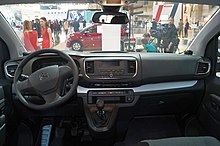
At the 2016 Geneva Motor Show, Citroën, Peugeot and Toyota revealed their latest generation of their respective vans. With this new generation the vans became more contemporary, and the Citroën and Peugeot models gained new names for the passenger versions: Citroën SpaceTourer and Peugeot Traveller. Toyota partially retained the Proace name, calling their version Proace Verso.
Commercial variants have been released in March 2016, under the Citroën Jumpy, Peugeot Expert and Toyota Proace names.[14][15] In 2019, Opel/Vauxhall switched to the PSA van platform for the Vivaro.
The Fiat Scudo and Ulysse nameplates were revived in 2022 using the PSA van platform, replacing the also Renault Trafic-based Talento.
In January 2022, Stellantis stopped marketing the internal combustion versions of its passenger vans in Europe (Switzerland and Balkan countries excepted).[16] This decision is mainly motivated by a decision to reduce the average CO2 emissions of vehicles marketed by the company in Europe in accordance with the CAFE (Corporate Average Fuel Economy) regulations set up by the European Union. As a result, the SpaceTourer, Traveller and Zafira Life are now only offered in their 100% electric and hydrogen versions. Panel van models are not affected by this change, nor are Toyota-badged models, as the Japanese manufacturer is in line with the objectives of the CAFE regulations.[17]
Production
Since 2017, both Citroën Jumpy and Peugeot Expert are assembled as CKD in Montevideo, Uruguay.[18] As of October 2019, Nordex S.A. has produced 13,000 units,[19] with most of them being exported to Brazil and Argentina.
In April 2018, PSA started the production of the Peugeot Expert and Citroën Jumpy in its Russian plant, in Kaluga.[20] The next month began the production of the Traveller and SpaceTourer in the same factory.[21] In December 2019, the Opel Zafira Life joined them on Kaluga assembly lines, followed by the Vivaro a few months later.[22]
In September 2018, PSA announced that the Luton plant would begin production of the third generation Citroën Jumpy/Dispatch/Spacetourer Peugeot Expert/Traveler ,but also the second generation of the Toyota ProAce and ProAce Verso from the end of 2019, which would also be badged as the Opel/Vauxhall Zafira Life/Vivaro Life/Vivaro to replace the Trafic-based Vivaro.[11]
In February 2022, Stellantis began exporting part of the production of the Russian plant in Kaluga to Western Europe, where Citroën, Peugeot, and Opel models are manufactured.[23] In March 2022, Stellantis halted exports from Russia following Moscow's invasion of Ukraine, putting an end to the short-lived export program from Kaluga.[24]
Special trims
GS
In October 2022, the Vauxhall Vivaro received a sporty GS trim option alongside a more powerful diesel engine.[25]
Electric versions
Electric versions are badged and sold by multiple Stellantis-owned brands as well as Toyota; they all share a common traction motor with the smaller Citroën e-Berlingo and its rebadged siblings, which has an output of 100 kW (130 hp) with 260 N⋅m (190 lbf⋅ft) torque;[26] the motor is also used for battery-electric PSA/Stellantis passenger cars such as the Peugeot e-208. While the e-Berlingo is fitted with a 50 kW-hr battery, the e-Jumpy (and its rebadged cousins) also offer a larger 75 kW-hr battery as an option. Quoted maximum driving range changes from 144 mi (232 km) under the WLTP cycle with the smaller battery to 205 mi (330 km) (WLTP) with the larger 75 kW-hr battery.[27] The vans are fitted with a 7.4 kW (AC) charger as standard, and an 11 kW (AC) charger is available as an option.[27]
| Marque | Light commercial vehicle (LCV) | Multi purpose vehicle (MPV) |
|---|---|---|
| Citroën | ë-Jumpy (EU) ë-Dispatch (UK) |
ë-SpaceTourer |
| Fiat | E-Scudo | E-Ulysse |
| Opel (EU) | Vivaro-e | Zafira-e Life |
| Peugeot | e-Expert | e-Traveller |
| Toyota | Proace Electric | Proace Verso Electric |
| Vauxhall (UK) | Vivaro Electric | Vivaro Life Electric |
Peugeot e-Expert/e-Traveller
In 2019, Peugeot introduced an electric version of their Expert van called e-Expert which shares the same platform as the Vivaro-e.[28] They later introduced an electric variant of the passenger Traveller called e-Traveller in June 2020.
Compared to the conventional diesel versions, there are some cosmetic changes such as blanked-off grille, instrument cluster which includes a battery charge-level gauge and new graphics for it infotainment system.[29][30]
Citroën ë-Jumpy/ë-Dispatch/ë-SpaceTourer
The Citroën ë-Jumpy (ë-Dispatch) is largely similar to the Peugeot e-Expert cargo van, while the Citroën ë-SpaceTourer is similar to the Peugeot e-Traveller passenger van.
Opel Vivaro-e/Zafira-e Life
In April 2020, Opel revealed the all-electric Vivaro-e. The Vivaro-e is available in three lengths and offers a payload capacity of up to 1,275 kg (2,811 lbs).[31] In the UK, the vehicle is sold under the Vauxhall brand.
The passenger model is called the Opel Zafira-e Life.
On 18 May 2021, Opel revealed the Vivaro-e Hydrogen. This new version has a payload of 1100 kg (compared to 1200 kg for the Vivaro-e and 1400 kg for the Vivaro). The Vivaro-e Hydrogen combines a 45 kW fuel cell with a 10.5 kW lithium-ion battery.[32] The hydrogen storage tanks are supplied by Symbio, a joint venture between Michelin and Faurecia. Peugeot then presented its e-Expert Hydrogen. These vans are manufactured at the Valenciennes plant and converted to hydrogen at the former Opel plant in Rüsselsheim.[33]
Toyota Proace Electric
The Proace Electric, available in passenger (Verso) and cargo versions, is a Toyota-badged twin of the electric vans from Groupe PSA described above.[34] The Proace Electric is the first all-electric passenger vehicle offered under the Toyota brand in Europe.
Fiat E-Scudo/E-Ulysse

In March 2022, Fiat unveiled the E-Ulysse, a battery electric derivative of its passenger van.[35] The cargo version is called the E-Scudo.
Hydrogen
On May 18, 2021, Opel presented the Vivaro-e Hydrogen. This version has a payload of 1,100 kg (2,400 lb) (contrary to 1,200 kg (2,600 lb) for the electric version and 1,400 kg (3,100 lb) for the combustion version). The Vivaro-e Hydrogen combines a 45 kW fuel cell with a 10.5 kW lithium-ion battery.[36] The hydrogen cylinders are supplied by Symbio, a joint venture between Michelin and Faurecia. Peugeot presented its e-Expert Hydrogen a few days later and Citroën its ë-Jumpy Hydrogen.[37][38] These vehicles are manufactured at the Valenciennes plant then converted to hydrogen at the former Opel plant in Rüsselheim.[33]
H Van inspired derivatives
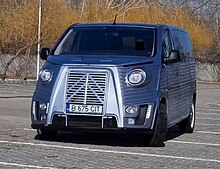
In 2017, Italian company FC Automobili revealed a modern interpretation of the Citroën H Van based on the Citroën Relay. The coach built, retro inspired conversion was available either pre assembled, or as a body kit, with 70 examples to be built to mark the 70th anniversary of the Citroën Type H.[39] FC Automobili was later renamed Caselani Carrosserie, and expanded its range with a smaller 'Type HG', based on the Citroën Jumpy. Both vans are available with either internal combustion engines or electric motors.[40]
Type Holidays Concept
At the 2023 Caravan Salon in Germany, Citroën revealed the Type Holidays, a Spacetourer based campervan with bodywork referencing the classic Citroën H Van. Styled by Caselani, The concept vehicle featured a pop-up roof with sleeping accommodation, as well as an on board kitchenette and folding bench seat. Citroën stated that the Type Holidays previewed a new range of vehicles with 'Holidays' branding, which would be aimed at van lifers and holidaymakers.[41][42]
Engines
| Model | Engine | Displacement | Valvetrain | Fuel system | Max. power at rpm | Max. torque at rpm | Gearbox | Years |
|---|---|---|---|---|---|---|---|---|
| Diesel engines | ||||||||
| 95 Multijet | Ford DLD-416 | 1,560 cc | DOHC 16v | Common rail direct injection | 90 hp (67 kW; 91 PS) @ 3,750 rpm | 210 N⋅m (155 lb⋅ft) @ 1,750 rpm | 5 speed manual | 2016–2019 |
| 115 Multijet | Ford DLD-416 | 1,560 cc | DOHC 16v | Common rail direct injection | 115 hp (86 kW; 117 PS) @ 3,500 rpm | 300 N⋅m (221 lb⋅ft) @ 1,750 rpm | 6 speed manual | 2016–present |
| 120 Multijet | PSA DW10 | 1,997 cc | DOHC 16v | Common rail direct injection | 120 hp (89 kW; 122 PS) @ 3,750 rpm | 340 N⋅m (251 lb⋅ft) @ 2,000 rpm | 6 speed manual | 2016–present |
| 150 Multijet | PSA DW10 | 1,997 cc | DOHC 16v | Common rail direct injection | 150 hp (112 kW; 152 PS) @ 4,000 rpm | 370 N⋅m (273 lb⋅ft) @ 2,000 rpm | 6 speed manual | 2016–present |
| 180 Multijet | PSA DW10 | 1,997 cc | DOHC 16v | Common rail direct injection | 177 hp (132 kW; 179 PS) @ 3,750 rpm | 400 N⋅m (295 lb⋅ft) @ 2,000 rpm | 6 speed automatic | 2016–2019
2019–present |
| Electric | - | - | - | - | 134 hp (100 kW; 136 PS) | 260 N⋅m (192 lb⋅ft) | - | 2020–present |
Gallery
Commercial versions
- Citroën Dispatch (UK)
- Citroën ë-Jumpy
- Peugeot Expert
- Opel Vivaro
- Vauxhall Vivaro
- Toyota Proace
- Fiat Scudo
- Caselani Citroën Jumpy Type HG
- Fiat Scudo Pickup version
Passenger versions
- Citroën SpaceTourer
- Citroën SpaceTourer Hyphen Concept
- Peugeot Traveller
- Opel Zafira Life
- Toyota Proace Verso
- Toyota Proace Verso
- Fiat E-Ulysse
Facelift
Stellantis introduced facelifts for the vans on October 23, 2023. In all versions, the upper grill has been completely removed for reduced air resistance. Each van has been given a larger 10-inch infotainment display, and new driver-assistance systems including Level 2 autonomous driving capabilities. The Citroën, Peugeot, Opel, Vauxhall and Toyota vans had also been fitted with the brand's respective updated logo.[43]
- 2024 Citroën Jumpy
- 2024 Citroën SpaceTourer
- 2024 Fiat Scudo
- 2024 Opel Vivaro
- 2024 Opel Zafira Life
- 2024 Peugeot Expert
- 2024 Toyota Proace
- 2024 Toyota ProAce Verso
Sales and production
| Year | Worldwide production | Worldwide sales | Notes |
|---|---|---|---|
| 2009 | 20,000[44] | 22,800[44] | |
| 2010 | 27,900[44] | 27,700[44] | |
| 2011 | 29,625[9] | 29,015[9] | Total production reaches 441,700 units.[9] |
| 2012 | 23,600[8] | 24,900[8] | Total production reaches 465,300 units.[8] |
| Year | Worldwide production | Worldwide sales | Notes |
|---|---|---|---|
| 2009 | 19,000[44] | 24,300[44] | |
| 2010 | 28,900[44] | 28,500[44] | |
| 2011 | 33,260[9] | 32,337[9] | Total production reaches 477,699 units.[9] |
| 2012 | 28,200[8] | 29,500[8] | Total production reaches 505,900 units.[8] |
Fiat
| Year | Worldwide production |
|---|---|
| 2022 | 18,674[45] |
References
- ^ From 1997 to 2018, the Renault Trafic served as the basis for the Opel and Vauxhall Vivaro, before GM sold Opel and Vauxhall to the PSA Group; thereafter, the base for the Vivaro changed to the Citroën Jumpy.
- ^ Joseph, Noah (2 December 2015). "Toyota, PSA extend partnership with new European van". Autoblog. Retrieved 4 April 2016.
- ^ Rosamond, Chris (25 March 2016). "New Fiat Talento panel van replaces long-serving Scudo". Auto Express. Retrieved 4 April 2016.
- ^ Crooks, Alastair (27 October 2021). "New Fiat Scudo and Ulysse to offer electric powertrains". Auto Express. Retrieved 28 November 2021.
- ^ "Citroën Jumpy 1.9 TD 1st Generation 92ps, (1995 - 2003)". car.info. Retrieved 13 May 2022.
- ^ "Citroën Jumpy Van 2.0 HDi Manual, 120hp, 2007 6-speed". car.info. Retrieved 13 May 2022.
- ^ "Citroen > Jumpy Multispace L2 HDi (128 hp) WLTP, MPG, Fuel consumption". motoreu.com. Retrieved 13 May 2022.
- ^ a b c d e f g "PSA Annual Report 2013". Car manufacturers. PSA. Archived from the original on 20 April 2012. Retrieved 17 June 2013.
- ^ a b c d e f g "PSA Annual Report 2012" (PDF). Car manufacturers. PSA. Retrieved 16 April 2013. [dead link]
- ^ "PSA and Fiat begin to end joint venture in 2017". Reuters. 12 May 2011. Retrieved 12 May 2011.
- ^ a b "Vauxhall's Luton plant to build the next Vivaro van". Auto Express.
- ^ "Peugeot e-Expert Hydrogen : Premier utilitaire à pile à combustible de la marque". 27 May 2021.
- ^ a b Dimensions Citroën Space Tourer M 2016 Carsized.com
- ^ Karkafiris, Michael (31 March 2016). "New Citroen Jumpy & Peugeot Expert Detailed". Carscoops. Retrieved 22 April 2016.
- ^ "Les nouveaux Peugeot Expert et Citroën Jumpy passent à l'offensive". L'argus.
- ^ "Citroën concentre son offre de vehicules particuliers sur Ë-Berlingo et Ë-SpaceTourer pour accelerer l'electrification de sa gamme". www.media.stellantis.com (in French). Retrieved 12 January 2022.
- ^ Gaudy, Géraldine (6 January 2022). "Traveller, Spacetourer et Zafira. Arrêt des moteurs essence et Diesel". www.largus.fr. Archived from the original on 5 January 2022. Retrieved 6 January 2022.
- ^ "Así se producen los Citroën Jumpy y Peugeot Expert en Uruguay". Retrieved 10 May 2021.
- ^ "Nordex produjo la unidad 13.000 de los modelos Citröen Jumpy y Peugeot Expert". Nordex (in Spanish). 28 October 2019. Retrieved 10 May 2021.
- ^ "Kaluga PSA plant has started the production of Peugeot and Citroen LCVs". RusAutoNews.Com. 7 March 2018. Retrieved 10 May 2021.
- ^ "PSA Group has expanded production at its Kaluga plant". RusAutoNews.Com. 20 June 2018. Retrieved 10 May 2021.
- ^ "Opel est de retour en Russie: le Zafira Life et le Grandland X en concession dès aujourd'hui". Média OPEL France (in French). Retrieved 10 May 2021.
- ^ Golubkova, Katya; Stolyarov, Gleb (25 January 2022). "Stellantis to start exporting Russia-made minivans to Western Europe". Reuters. Retrieved 13 March 2022.
- ^ Studer, Elisabeth (13 March 2022). "Stellantis:la Russie n'est plus plaque tournante d'exportations de vans". Leblogauto.com (in French). Retrieved 13 March 2022.
- ^ "Vauxhall Vivaro Gains Sporty GS Trim and More Powerful Diesel Engine". 5 October 2022.
- ^ Ashraf, Yousuf (10 January 2022). "2022 Citroen Berlingo and SpaceTourer MPVs go electric-only". Auto Express. Retrieved 22 November 2022.
- ^ a b Gibson, Dean (10 May 2021). "Citroen e-Dispatch review". Auto Express. Retrieved 22 November 2022.
- ^ "All-New PEUGEOT E-Expert: The Expert In Electric". www.peugeot.co.uk. 2019. Retrieved 24 July 2022.
- ^ Wilkinson, Luke (8 November 2019). "New electric 2020 Peugeot e-Expert van unveiled". Auto Express. Retrieved 5 June 2020.
- ^ Allan, Lawrence (4 June 2020). "New Peugeot e-Traveller launched as electric eight-seat MPV". Autocar. Retrieved 5 June 2020.
- ^ "New Opel Vivaro-e: "E" for Emissions-Free Deliveries | Media OPEL International". int-media.opel.com. Retrieved 6 June 2020.
- ^ "Opel Vivaro-e Hydrogen : l'utilitaire passe à la pile à combustible". Autonews Pro (in French). 18 May 2021. Retrieved 27 May 2021.
- ^ a b Mary, Hubert (27 May 2021). "Peugeot dévoile la future version hydrogène et made in France de son utilitaire e-Expert". L'Usine Nouvelle (in French).
- ^ "Toyota Proace Verso Electric (2021) mit PSA-Technik".
- ^ "2022 Fiat E-Ulysse Debuts As An Electric "Living Room" For Europe". Motor1.com. Retrieved 13 March 2022.
- ^ "Opel Vivaro-e Hydrogen : l'utilitaire passe à la pile à combustible". Autonews Pro. 18 May 2021.
- ^ "Peugeot e-Expert Hydrogen (2021) : l'utilitaire à hydrogène". 31 May 2021.
- ^ "Citroën ë-Jumpy Hydrogen (2021) : la famille des utilitaires à hydrogène s'agrandit". Autonews Pro. 4 June 2021.
- ^ Dobie, Stephen (3 April 2017). "You can buy a brand new Citroen H Van". Top Gear. Retrieved 10 January 2024.
- ^ Mills, James (12 October 2020). "Italian coachbuilder expands its range of retro Citroën Type H vans". Hagerty UK. Retrieved 10 January 2024.
- ^ Smith, Christopher (27 August 2023). "Citroen Type Holidays concept debuts as modern camper with retro style". Motor1.com. Retrieved 10 January 2024.
- ^ Hood, Bryan (28 September 2023). "Citroën's Stylish New Camper Van Brings Retro Cool to #Vanlife". Robb Report. Retrieved 10 January 2024.
- ^ "Stellantis upgrades electric van line-up".
- ^ a b c d e f g h "Engine specs from PSA Peugeot Citroën" (PDF). Creator and designer. PSA Peugeot Citroën. Archived from the original (PDF) on 5 June 2017. Retrieved 29 November 2012.
- ^ "Le top 20 des voitures les plus produites en France en 2022". www.largus.fr. Retrieved 21 July 2023.




